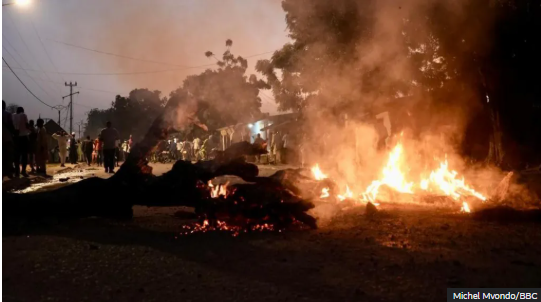BBC News
Tchiroma Bakary has insisted he won the presidential election held on 12 October, challenging incumbent President Paul Biya's 43-year-old hold on power.
In Summary
- The regional governor, Samuel Dieudonné Diboua, said police posts had come under attack and security forces had defended themselves.
- Hundreds of supporters of opposition presidential candidate, Issa Tchiroma Bakary, defied a ban to hold protests in several cities, clashing with security forces.
At least four people have been killed during protests in Cameroon's economic capital of Douala, authorities say, ahead of the official announcement of results in a highly-contested presidential election.
The regional governor, Samuel Dieudonné Diboua, said police posts had come under attack and security forces had defended themselves.
Hundreds of supporters of opposition presidential candidate, Issa Tchiroma Bakary, defied a ban to hold protests in several cities, clashing with security forces.
Tchiroma Bakary has insisted he won the presidential election held on 12 October, challenging incumbent President Paul Biya's 43-year-old hold on power. The ruling CPDM party has dismissed the claims.
Diboua condemned the deadly protests that he described as "premeditated acts of violence" and a serious attack on public order and national security.
"Four people unfortunately lost their lives," he said, adding that several members of the security forces were also injured.
"Investigations have been opened, so that light can be shed on these unfortunate incidents," he added, while threatening to take action against the instigators.
In Tchiroma Bakary's stronghold of Garoua, a city in the north of the country, police fired tear gas and water cannons at his supporters.
The protesters were denouncing what they said was a plan by the ruling party, the Cameroon People's Democratic Movement (CPDM), to "steal the victory" from the opposition leader.
The demonstrations came after Tchiroma Bakary called on his supporters in the country and the diaspora to march peacefully to "liberate Cameroon".
Authorities have banned gatherings until Monday, when Cameroon's constitutional council is set to announce the results.
In Garoua, the demonstrations began peacefully but quickly turned rowdy when security forces threw teargas on the streets to disperse the hundreds of people that had gathered in support of Tchiroma Bakary.
"We are not here for disorder. We're demanding the truth of the ballot," a placard read.
One protester was seen carrying a banner urging US President Donald Trump to help them.
"We are here to claim our victory. We are making a peaceful march, which is a civil right for all Cameroonians - for everyone," another protester said.
Supporters also took to the streets in the south-western city of Douala. "We want Tchiroma, we want Tchiroma," protesters chanted, Reuters news agency reports.
Tchiroma Bakary previously told the BBC that he would not accept a stolen vote. He said his team had compiled the overall picture based on results from individual polling stations.






